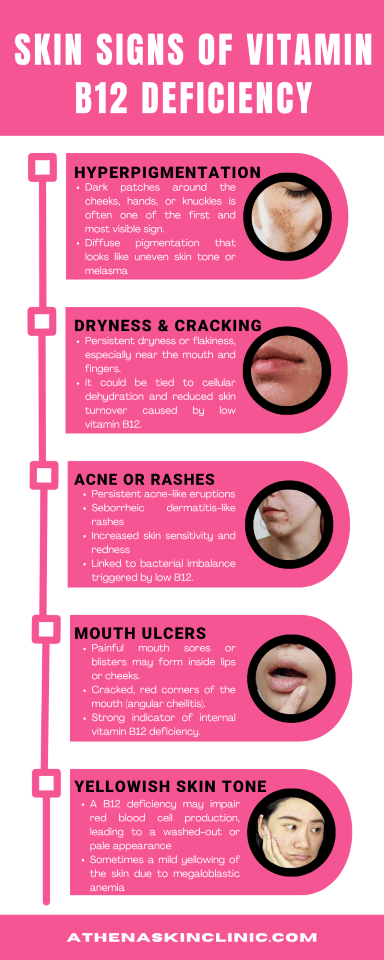If you’ve recently noticed unexplained skin changes—unusual pigmentation, chronic dryness, rashes, or acne that won’t go away—you might be wondering: Could it be something deeper?
One often-overlooked cause of skin concerns is Vitamin B12 deficiency, and for many people, it goes undiagnosed far too long.
In this article, we’ll break down everything you need to know about how Vitamin B12 deficiency can affect your skin, how to spot the signs early, and most importantly—what you can do about it.
Why Is Vitamin B12 So Important for Your Skin?
Vitamin B12 (cobalamin) is a water-soluble vitamin that plays a vital role in many functions of the body, including:
- DNA synthesis
- Red blood cell formation
- Nerve function
- Cellular repair
When you don’t have enough B12 in your system, the effects show up in many ways—your skin being one of the first places to reflect those internal imbalances.
Book Your Skin Consultation with Dr. Harmandeep Sidhu
Trusted dermatologist in Chandigarh. Get expert care in skin, hair and lasers at Athena Skin Clinic.

Who’s Most at Risk for B12 Deficiency?
Before diving into the skin-related symptoms, it’s important to know whether you’re at higher risk. You may be more likely to develop a B12 deficiency if you:
- Follow a vegan or vegetarian diet (B12 is mostly found in animal products)
- Have digestive issues like gastritis, Crohn’s disease, or celiac disease
- Take medications like metformin (for diabetes) or proton pump inhibitors (for acid reflux)
- Are over the age of 50
- Have undergone gastrointestinal surgery (e.g., bariatric surgery)
- Suffer from autoimmune disorders such as pernicious anemia
If any of these apply to you and your skin is acting up—read on.
Skin Signs of Vitamin B12 Deficiency
Vitamin B12 deficiency doesn’t affect everyone in the same way, but several skin-related symptoms are commonly reported and studied. Here are the most relevant ones to watch for:
-
Hyperpigmentation
This is often one of the first and most visible signs. You may notice:
- Dark patches around the cheeks, hands, or knuckles
- Diffuse pigmentation that looks like uneven skin tone or melasma
Research has linked B12 deficiency to melanin overproduction, particularly in darker skin tones.
-
Chronic Dryness and Cracking
If your skin is consistently dry, flaky, or cracked—especially around the mouth or fingertips—it could be tied to cellular dehydration and reduced skin turnover caused by low B12.
-
Inflammatory Acne or Rashes
Although uncommon, a deficiency in B12 may lead to:
- Persistent acne-like eruptions
- Seborrheic dermatitis-like rashes (scaly, red patches, especially around the nose or scalp)
- Increased skin sensitivity and redness
Some people experience inflammatory breakouts due to an imbalance in the skin’s bacterial profile, worsened by low B12 levels.
-
Mouth Ulcers and Angular Cheilitis
These may not seem like skin issues, but they’re often the first clue to internal deficiencies.
- Painful sores inside the mouth
- Cracked, red skin at the corners of the lips
-
Pale or Yellowish Skin Tone
A B12 deficiency may impair red blood cell production, leading to:
- A washed-out or pale appearance
- Sometimes a mild yellowing of the skin due to megaloblastic anemia
Other (Non-Skin) Symptoms to Watch For
Even if skin issues are your main concern, B12 deficiency rarely happens in isolation. Be alert to these supporting symptoms:
- Constant fatigue, even after good sleep
- Tingling or numbness in fingers and toes
- Poor memory or mental fog
- Mood swings or unexplained anxiety
- Muscle weakness
- Breathlessness or palpitations
If your skin issues coincide with any of these, it’s a strong indicator that you should get your B12 levels tested.
Testing for Vitamin B12 Deficiency
A simple blood test can confirm a B12 deficiency. Your doctor will usually look at:
- Serum B12 levels
- Methylmalonic acid (MMA) and homocysteine (often elevated in early deficiency)
- Complete blood count (CBC) to assess for anemia
It’s especially important not to self-diagnose or supplement without testing, as B12 can mask
How to Treat B12 Deficiency and Restore Skin Health?
Once diagnosed, B12 deficiency is typically straightforward to treat, and many people notice a difference in their skin within weeks.
-
Dietary Changes
If you’re not severely deficient, you may benefit from B12-rich foods like:
- Eggs
- Dairy (milk, cheese, yogurt)
- Meat (beef, poultry, lamb)
- Fish and shellfish (especially salmon, sardines, and tuna)
- Fortified cereals or plant milks (for vegans)
-
Oral Supplements
Your doctor may recommend a daily B12 supplement, especially if you’re vegan or vegetarian. Most people absorb cyanocobalamin or methylcobalamin well in pill or lozenge form.
-
B12 Injections
In cases of severe deficiency or poor absorption (such as in pernicious anemia), intramuscular B12 injections may be necessary for faster correction.
-
Skin Care Adjustments
While treating the root cause is crucial, your skin may still need extra care during recovery:
- Use gentle, fragrance-free cleansers
- Apply ceramide-rich moisturizers to restore the skin barrier
- Add topical antioxidants (like niacinamide or vitamin C) to support skin repair
- Use SPF daily, especially if you’re dealing with hyperpigmentation
How Long Until You See Results?
While energy levels and mood often improve within a week or two, skin changes take more time. You can expect to see improvements in:
- Pigmentation: 6–12 weeks
- Dryness and irritation: within 2–4 weeks
- Acne or inflammation: variable, but generally improves within 1–2 months
Consistency with supplementation and skincare is key.
When to Seek Medical Help Immediately
- If your skin changes are worsening rapidly
- If you experience numbness, vision changes, or balance issues
- If you’re pregnant or planning to become pregnant (B12 is vital for fetal development)
Final Thoughts
Vitamin B12 deficiency is more common than you think, especially among people following restricted diets or living with gut-related health issues. While it often flies under the radar, your skin may be the first to alert you that something’s off.
If you’re seeing new or unusual skin changes—and they’re accompanied by fatigue, brain fog, or mood swings—don’t ignore them. Talk to your doctor, get tested, and start your path to recovery. With proper treatment and care, your skin—and your health—can bounce back beautifully.
If you need help with cosmetic issues related to B12 deficiency, contact Athena Skin Clinic.

